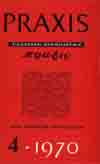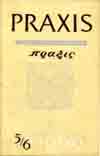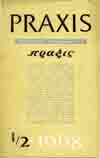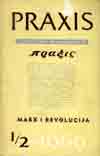
We kindly inform you that, as long as the subject affiliation of our 300.000+ articles is in progress, you might get unsufficient or no results on your third level or second level search. In this case, please broaden your search criteria.


Letter from the Department of Philosophy and Sociology, University of Belgrade
More...
Nakon sveska u kojem su objavljene intervencije i diskusije sa konferencije o temi »Marx i revolucija« (održane u Korčuli u kolovozu 1968), međunarodno izdanje jugoslavenskog časopisa Praxis donosi u posljednjem broju (3 - 4, 1969) zbir priloga preuzetih iz beogradskog časopisa Fiosofija (veoma slabo poznatog jer izlazi samo na hrvatskosrpskom jeziku). Namjera je Praxisa da otpočne s davanjem šireg pregleda jugodavenske filozofske kulture, ili još bolje, perspektive teorijske analize koja odgovara stavu najrazvijenije lijeve kulture vezane poglavito za sveučilišta u Zagrebu i Beogradu.
More...



»De omnibus dubitandum« navijestio je kao svoj omiljeni motto Marx, koji je i za sebe rekao da nije marksist. A već kod mladog Marxa piše: »Ako konstrukcija budućnosti i dovršenje za sva vremena nije naša stvar, onda je utoliko izvjesnije, što imamo u sadašnjici izvesti, mislim na bezobzirnu kritiku svega postojećeg, bezobzirnu kako u tom smislu, da se hitika ne boji svojih rezultata kao ni konflikta s postojećim moćima«. U Tezama o Feuerbachu ukazao je on naročito na »ljudsku praksu« i na »poimanje ove prakse«, na »zbilju i moć, ovostranost« ljudskog mišljenja, da bi naposlijetku interpretaciji (prošlog?) svijeta pomoću filozofije suprotstavio izmjenu (budućeg?) svijeta.
More...



Na svom sastanku 28. III 1968. redakcija časopisa Praxis razmotrila je vijesti objavljene u dnevnoj štampi o smjenjivanju šestorice profesora Varšavskog univerziteta: B. Baczka, Z. Baumana, W. Brusa, M. Hirszowicz, L. Kolakowskog i S. Morawskog. Budući da je riječ o eminentnim filozofima i sociolozima marksistima čija su djela i ideje dobro poznati svjetskoj javnosti i od kojih su dvojica ujedno i članovi redakcijskog savjeta Praxis, smatramo svojom dužnošću da javno iznesemo naše mišljenje o tome.
More...
U prilogu ovom pismu šaljemo Vam izjavu redakcije časopisa »Praxis« u vezi sa otpuštanjem šestorice profesora Varšavskog univerziteta. Izjavu smo također uputili ambasadi N.R. Poljske u Beogradu, odgovornim faktorima u N.R. Poljskoj (rektoru univerziteta i ministru prosvjete) te predstavnicima jugoslavenske, poljske, čehoslovaoke, francuske i talijanske štampe.
More...

Uz najnovije »financijske teškoće« Praxisa U toku tri i po godine svog izlaženja časopis Praxis stekao je izuzetno mjesto među jugoslavenskim časopisima. Među članovima redakcije i redakcijskog savjeta te suradnicima Praxisa nalaze se danas najeminentniji predstavnici jugoslavenske i svetske marksističke filozofske i sociološke misli, kao i neki od najznačajnijih progresivnih filozofa i sociologa nemarksista. Nije nam poznat nijedan drugi filozofski ili sociološki časopis u svijetu koji bi na sličan način okupljao najistaknutije svjetske marksiste. Isto tako nije nam poznat nijedan drugi časopis u Jugoslaviji, ni na kojem području znanstvenog ili umjetničkog stvaralaštva, koji bi u redovima svojih urednika i suradnika okupljao najznačajnije suvremene predstavnike svog područja na onaj način na koji Praxis okuplja najeminentnije marksističke filozofe i sociologe.
More...
Od 14. do 24. augusta 1968. godine održat će se peto međunarodno zasjedanje Korčulanske ljetne škole. Ovogodišnje zasjedanje posvećeno je 150-toj godišnjici rođenja Karla Marxa i glavna je proslava u našoj zemlji ove značajne obljetnice.
More...
Replies of the members of the Praxis's editorial council
More...
Odavno se nije na jedan časopis sručilo toliko teških kritika, optužbi i uvreda kao na naš časopis u posljednje vrijeme. Kao da je trebalo po hitnom postupku pronaći »pravoga krivca« za sve neprilike, teškoće, neriješene probleme u našem društvu u toku posljednjih godina. Teško se oteti dojmu da su studentska previranja, bar s te .strane, iskorištena kao dobar povod da se na svijetlo dana izvuče »stari krivac za sve«: »Praxis« i ljudi u njemu i oko njega. Ali ostavimo zasad po strani pitanje o uzrocima i povodima tih kritika i obratimo se samom »fenomenu«.
More...
U broju 3 za 1968. obavijestili smo naše čitaoce o financijskim teškoćama zbog kojih smo taj broj morali izdati u izuzetno smao njenom opsegu (na 28 strana), a većinu priloga već pripremljenih za objavljivanje ostaviti za idući broj. U vrijeme kad je objavljen broj 3, naš dug za 1967. i 1968. godinu iznosio je preko 15 milijuna starih dinara. U međuvremenu Savjet za naučni rad SR Hrvatske dodijelio nam je 10 milijuna starih dinara, što, nam je omogućilo da platimo dio dugova i privolimo tiskaru da na kredit štampa i ovaj broj u kojem donosimo radove što su bili predviđeni za broj 3.
More...
Korcula Summer School - V International Session
More...
Odgovori članova redakcijskog savjeta Praxis (E. Bloch, Th. Bottomore, U. Cerroni, M. Farber, E. Fromm, L. Goldmann, B. lbrahimpaši!ć, M. Marković, K. Kosik, E. Paci, D. Riesman) Pismo Tadeusza Kotarbinslkog
More...